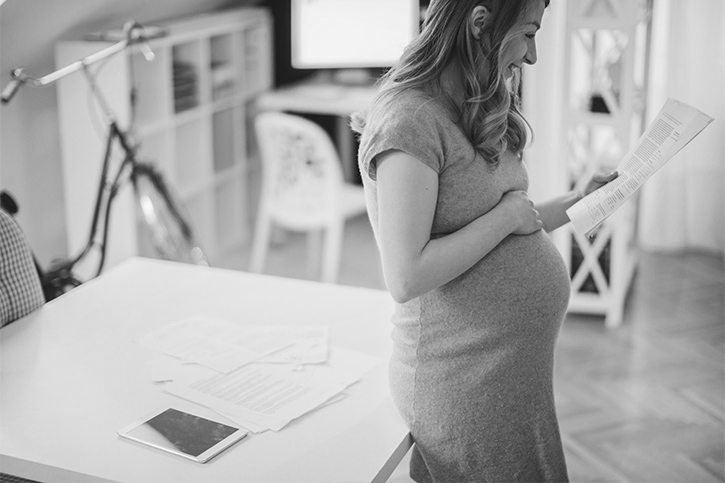Pregnancy is a double-edged sword when it comes to fatigue. First of all, it can be exhausting – your body is working double time to help your baby grow, meanwhile the extra weight you are carrying around, combined with myriad physical and mental hurdles, mean your energy levels may feel heavily depleted.
Secondly, getting all the rest you need can be tricky: depending on how far along you are, it can be hard to get comfortable, heartburn, reflux, backaches, leg cramps and itching can keep you up, and a constant need to pee may mean you feel like you’re spending more time in the bathroom than in bed.

Getting plenty of rest is extremely important for your health and your baby’s development. Here are 7 helpful tips for sleeping during pregnancy.
However, getting enough sleep is very important. You’ll need all the energy you can muster during the day and a good night’s rest is the best way to ensure you feel recharged each day. Here are some tips for sleeping during pregnancy that may help.
Watch What You Eat and Drink
Two of the biggest culprits for a restless night in bed are frequent urination and acid reflux (heartburn). Your growing baby places pressure on the organs around your stomach. This can force acid up into your throat, causing heartburn. Your uterus will also press against your bladder more and more as it grows, which will make you need to pee more frequently.
The best way the avoid both of these causing problems when you want to sleep is to watch what you eat and drink before you go to sleep. It is important to stay well hydrated while you are pregnant, but to ensure your bladder is empty when you go to bed, don’t drink anything two hours beforehand and go to the toilet right before you get into bed. Make sure you are eating dinner well beforehand too, and avoid snacking afterwards. It’s likely this will cause reflux!
Try Sleeping on Your Side
With your baby taking up a whole lot of space in your stomach, it can be tough to get comfortable while sleeping. If you like lying on your stomach, you can kiss this position goodbye (especially as you enter your second and third trimester). Lying on your back can cause unwanted pressure on your lungs and uterus, so try to avoid this. It can also lead to compression of the vessels in the lower half of your abdomen, and which has been suggested to be a cause of stillbirth.
The most comfortable position is on your side – your left side actually (this has been shown to improve circulation and nutrient delivery to your baby). Pillows are a great addition to this position: place a pillow between your legs. This will align your legs with your spine and help reduce pressure on your back and sciatic nerve.
Make Time to Clear Your Mind
Aside from the physical discomfort of trying to sleep with a pregnant belly, it can be hard to relax and unwind when you have a million things running through your mind. Stress and anxiety are common during pregnancy and these can have an impact on your sleep. Set aside time to wind down and clear your mind before you hop into bed.
The way you do it is totally up to you: read a book, stretch, meditate – whatever works to help you switch off. Put your phone and computer away and try to avoid other distractions. Keep track of what you need to do and try to stay organised to reduce stress.
Set A Routine
This and the above go hand in hand. If you’re completely exhausted when you get home but struggle to fall asleep when you go to bed, you may want to try putting in place a strict nightly routine and making sure you stick to it.
If you take a nap as soon as you get home, then get up and begin your evening, or if you find yourself working at your computer after dinner before you get into bed, this can have an impact on sleep. Allocate time for work/recreation, chores, dinner and relaxation (making sure this is the last thing you do) each night.
Nap During The Day If You Can, But Not Too Much
If you have the luxury of being able to nap during the day – lucky you! This is totally fine, but make sure you aren’t napping too much or too long. More than 30 minutes and you will start going into a deep sleep, and this can affect how you sleep later on. Keep it to 10-20 minutes. This will leave you feeling refreshed but not groggy, and ensure you can still get a good night’s rest later on.
Turn Down The Heat
While you are pregnant, your body temperature increases. This will leave you feeling warmer than usual, so if it’s winter and you are using heaters or central heating, turn them down or off well before you go to bed to help you keep cool and stave off restlessness.
Keep an Eye on Your Diet
While you’re pregnant, it’s a good idea to avoid caffeine completely. If you do drink caffeinated beverages, keep it to no more than 200mg (of caffeine) per day and only in the morning. This will ensure it does not affect the way you sleep. If nausea is causing you grief, eat bland snacks during the day to keep you feeling full and satisfied. A balanced diet full of nutrients will also help you sleep at night.
If you have any questions about pregnancy, please don’t hesitate to get in touch. Dr Brown is one of the most trusted obstetricians in Sydney and will be happy to offer advice and compassionate care in every way possible.
